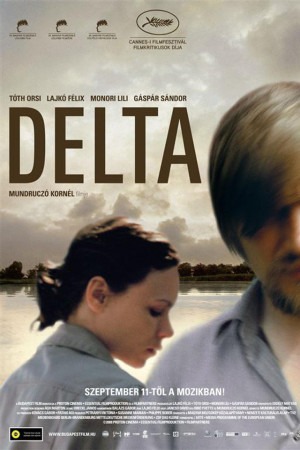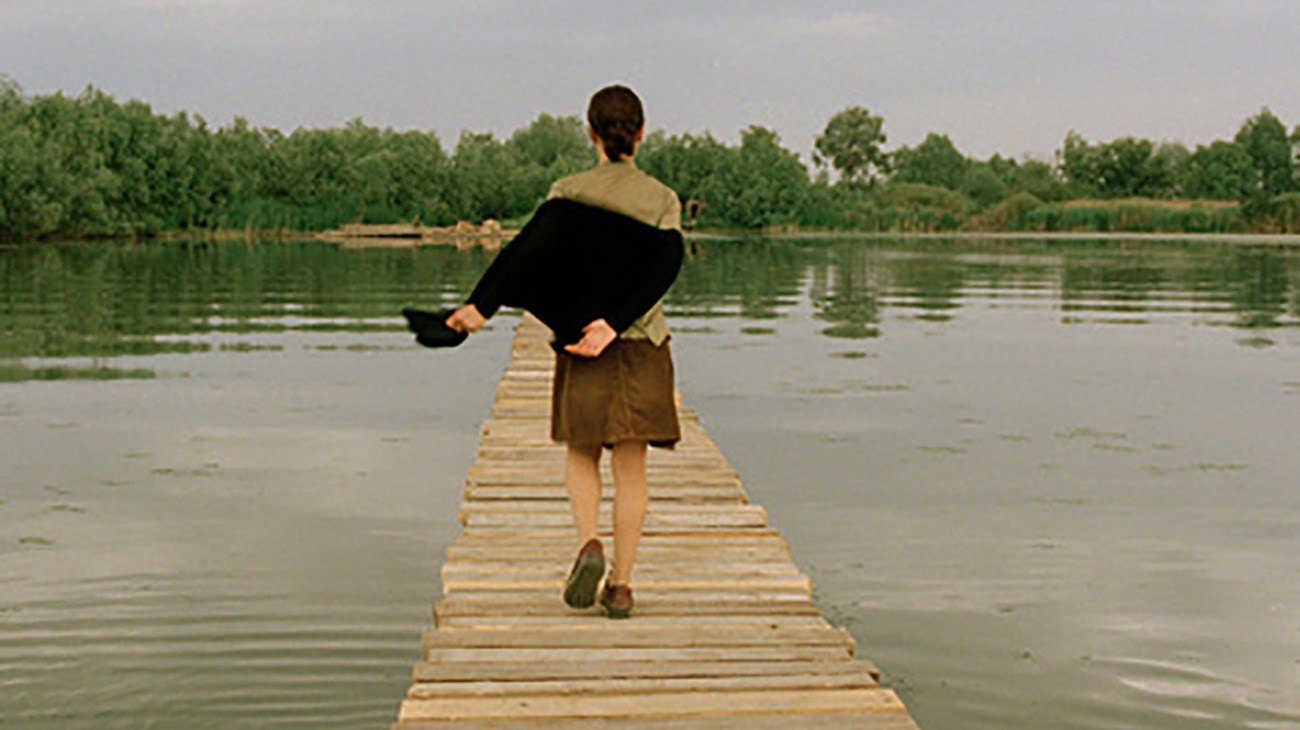
The 44th Chicago International Film Festival
To be entirely fair, it's more than a little impressive that Mundruczó Kornél's Delta was completed at all, no matter how underdone the final project feels. Back in 2006, the film was about half-finished when Bertók Lajos, the actor playing the main character, died suddenly, and it took close on to a year for production to resume, with the unfortunate hurdle that nearly every completed scene would have to be re-filmed with new star Lajkó Félix.
The resulting film lies squarely on the very thin line that separates intelligent art films from plodding misfires, with a few too many diversions onto the wrong side of that line to be regarded as anything but a failure. In dropping the name of fellow Hungarian director Tarr Béla into the credits under "special thanks", Mundruczó reveals quite a bit about what he wanted to do with Delta, but the film's similarity with the work of Tarr is strictly superficial. Anyone can put together an extremely slow-paced & virtually dialogue-free collection of images, but not everyone can turn such a thing into a powerful work of art.
Delta concerns a young prodigal son (Lajkó) who returns to his birthplace in the Danube delta for reasons that are never really explained, where he meets his grown-up sister, (Tóth Orsolya) - it's not entirely clear if they've never met, or just not since she was a very little girl. Their mother (Monori Lili, also brought to the cast during the production hiatus) is at this time living with a thuggish man (Gáspár Sándor), and to save his sister from his brutality, the young man invites her to live with him in the waterfront cottage he's calling home until he can complete construction of a house out in the river, on stilts. This simply act of brotherly affection scandalizes the local village and angers their parents, and it does at times seem that there may be more to their relationship than necessarily ought to crop up between siblings. There are a lot of missing details from the story - the character names, for a start (the brother and sister are called Mihail and Fauna in the credits) - but that's not inherently a bad thing; it tends to make the film seem more like a fable.
Delta also concerns trees and water, fish swimming in the river and turtles walking through the grass. It is an utterly remarkable and wholly beautiful exhibition of nature cinematography, courtesy of Erdély Mátyás, and one of the most visually hypnotic films of 2008. The Danube delta is, without exaggeration, the most important character in the film, the force which shapes everyone and everything else. Delta is an absolutely beautiful case of a kind of story we don't see that often: the quiet study of humans and their land.
So what's the problem? Basically, those two films I just identified - the slow-moving tragic fable and the slower-moving man-and-nature study - never join together. I don't know if Terrence Malick is a cultural touchstone in Hungary the way he is in America, but I'd love to be able to say that Mundruczó's goal was to create something like Days of Heaven or The New World, both dreamlike evocations of how human drama is overwhelmed by the natural world. But those films, and most good mock-Malick such as David Gordon Green's George Washington, succeed at demonstrating that the story is an inevitable by-product of place. Delta presents the hell out of a place, but the story it tells doesn't grow out of the land, it's set down upon it.
It probably doesn't help matters that the story doesn't ultimately hang together very well. The writers (Mundruczó and Bíró Yvette) are so hell-bent on copying the tone of Tarr's films, with semi-anonymous figures being treated as archetypes, and scenes creeping by without incident, that they fail to notice that these characteristics aren't the point of Tarr's cinema, they're the byproduct of his treatment of his films as a condensed version of the universe. But the story and setting in this film are much more specific than anything in Tarr. In other words, the plot of Delta indicates that it is meant to be a character study, but the characters indicate that it is meant to be an allegory, or at least a myth. Is this the inevitable fate of combining the cinema of Malick - which hinges on digging out the exact specific truths of a singular place - with that of Tarr - which is generally a matter of obscuring specific truths in favor of universal ones.
Now, despite all that, I can't really let myself get terribly angry or even annoyed at Delta, and it's for this reason: staggeringly good nature cinematography. It might not walk and talk like a Malick movie, but damned if it doesn't look like a Malick movie. It's dramatic flaws are strictly the sort of thing you think about in the days after watching the film, but in the theater, watching the film, it's hard to think about anything other than the graceful loveliness onscreen.
6/10
The resulting film lies squarely on the very thin line that separates intelligent art films from plodding misfires, with a few too many diversions onto the wrong side of that line to be regarded as anything but a failure. In dropping the name of fellow Hungarian director Tarr Béla into the credits under "special thanks", Mundruczó reveals quite a bit about what he wanted to do with Delta, but the film's similarity with the work of Tarr is strictly superficial. Anyone can put together an extremely slow-paced & virtually dialogue-free collection of images, but not everyone can turn such a thing into a powerful work of art.
Delta concerns a young prodigal son (Lajkó) who returns to his birthplace in the Danube delta for reasons that are never really explained, where he meets his grown-up sister, (Tóth Orsolya) - it's not entirely clear if they've never met, or just not since she was a very little girl. Their mother (Monori Lili, also brought to the cast during the production hiatus) is at this time living with a thuggish man (Gáspár Sándor), and to save his sister from his brutality, the young man invites her to live with him in the waterfront cottage he's calling home until he can complete construction of a house out in the river, on stilts. This simply act of brotherly affection scandalizes the local village and angers their parents, and it does at times seem that there may be more to their relationship than necessarily ought to crop up between siblings. There are a lot of missing details from the story - the character names, for a start (the brother and sister are called Mihail and Fauna in the credits) - but that's not inherently a bad thing; it tends to make the film seem more like a fable.
Delta also concerns trees and water, fish swimming in the river and turtles walking through the grass. It is an utterly remarkable and wholly beautiful exhibition of nature cinematography, courtesy of Erdély Mátyás, and one of the most visually hypnotic films of 2008. The Danube delta is, without exaggeration, the most important character in the film, the force which shapes everyone and everything else. Delta is an absolutely beautiful case of a kind of story we don't see that often: the quiet study of humans and their land.
So what's the problem? Basically, those two films I just identified - the slow-moving tragic fable and the slower-moving man-and-nature study - never join together. I don't know if Terrence Malick is a cultural touchstone in Hungary the way he is in America, but I'd love to be able to say that Mundruczó's goal was to create something like Days of Heaven or The New World, both dreamlike evocations of how human drama is overwhelmed by the natural world. But those films, and most good mock-Malick such as David Gordon Green's George Washington, succeed at demonstrating that the story is an inevitable by-product of place. Delta presents the hell out of a place, but the story it tells doesn't grow out of the land, it's set down upon it.
It probably doesn't help matters that the story doesn't ultimately hang together very well. The writers (Mundruczó and Bíró Yvette) are so hell-bent on copying the tone of Tarr's films, with semi-anonymous figures being treated as archetypes, and scenes creeping by without incident, that they fail to notice that these characteristics aren't the point of Tarr's cinema, they're the byproduct of his treatment of his films as a condensed version of the universe. But the story and setting in this film are much more specific than anything in Tarr. In other words, the plot of Delta indicates that it is meant to be a character study, but the characters indicate that it is meant to be an allegory, or at least a myth. Is this the inevitable fate of combining the cinema of Malick - which hinges on digging out the exact specific truths of a singular place - with that of Tarr - which is generally a matter of obscuring specific truths in favor of universal ones.
Now, despite all that, I can't really let myself get terribly angry or even annoyed at Delta, and it's for this reason: staggeringly good nature cinematography. It might not walk and talk like a Malick movie, but damned if it doesn't look like a Malick movie. It's dramatic flaws are strictly the sort of thing you think about in the days after watching the film, but in the theater, watching the film, it's hard to think about anything other than the graceful loveliness onscreen.
6/10






